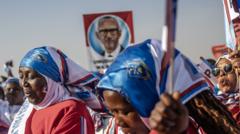Paul Kagame has been sworn in for a fourth term as Rwanda’s president after winning 99% of the vote in last month’s election.
While some hail Mr Kagame for bringing peace and stability to his country after the 1994 genocide, others accuse him of running a repressive regime in a country where ordinary people are afraid to openly criticise him.
Rights groups say the margin of his electoral victory is proof of the lack of democracy in Rwanda.
Only two candidates were allowed to stand against Mr Kagame in the 15 July election.
In his four presidential elections, he has always gained at least 93% of the vote.
Several African heads of states were among the many thousands who attended the ceremony in the packed 45,000 capacity Amahoro National Stadium in the capital, Kigali.
In his oath of office, Mr Kagame vowed to preserve peace and national sovereignty, and to consolidate national unity.
He also pledged to “never use the powers conferred upon me for personal interests”.
“Should I fail to honour this oath, may I be subjected to the rigours of the law,” he said.
Mr Kagame has been the real power in Rwanda since his then rebel forces came to power at the end of the genocide in which some 800,000 ethnic Tutsis and moderate Hutus were slaughtered, ousting the genocidal regime.
Since then, Rwanda has been relatively stable, with Mr Kagame seeking to turn the country into the “Singapore of Africa”.
The capital is one of Africa’s cleanest cities and is home to the African Basketball League, which is a partnership with the NBA. It hosted the Commonwealth Heads of Government Meeting in 2022 and international stars like Kendrick Lamar have played concerts there.
Mr Kagame often criticises the West, yet he has also sought to build alliances, for example with the UK over the now scrapped policy of deporting asylum seekers to Rwanda, agreed with the former Conservative government.
While life has improved in Rwanda, Mr Kagame is accused of destabilising the neighbouring Democratic Republic of Congo.
Just days before the July election, a UN report said there were some 4,000 Rwandan troops in DR Congo, where they are accused of backing the M23 rebel group, fuelling a bitter row between the two countries.
Under Mr Kagame, Rwandan troops have twice invaded DR Congo, saying they were pursuing Hutu militias linked to the 1994 genocide.
Go to BBCAfrica.com, external for more news from the African continent.
Follow us on Twitter @BBCAfrica, external, on Facebook at BBC Africa, external or on Instagram at bbcafrica, external

